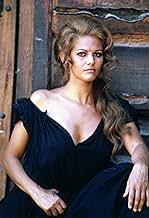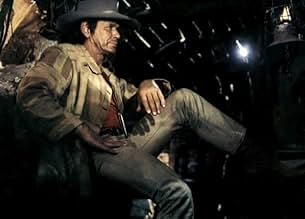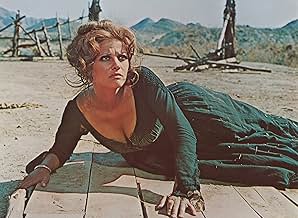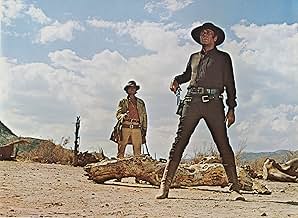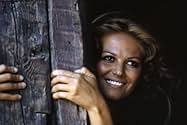Un misterioso extraño con una armónica se alía con un famoso forajido para proteger a una bella viuda de un despiadado asesino que trabaja para el ferrocarril.Un misterioso extraño con una armónica se alía con un famoso forajido para proteger a una bella viuda de un despiadado asesino que trabaja para el ferrocarril.Un misterioso extraño con una armónica se alía con un famoso forajido para proteger a una bella viuda de un despiadado asesino que trabaja para el ferrocarril.
- Dirección
- Guionistas
- Elenco
- Premios
- 6 premios ganados y 5 nominaciones en total
Livio Andronico
- Bit part
- (sin créditos)
Salvatore Basile
- Member of Cheyenne's Gang
- (sin créditos)
Aldo Berti
- Member of Frank's Gang Playing Poker
- (sin créditos)
Regina Elena Bisio
- Old Woman in the Tavern
- (sin créditos)
Joseph Bradley
- Train Station Master
- (sin créditos)
Marilù Carteny
- Mourner at Brett McBain's Funeral
- (sin créditos)
Resumen
Reviewers say 'Once Upon a Time in the West' is acclaimed for Sergio Leone's masterful direction, stunning landscapes, and Ennio Morricone's iconic score. Strong performances by Henry Fonda, Charles Bronson, and Claudia Cardinale are highlighted. The film's slow-burning intensity, moral ambiguity, and unforgettable characters cement its status as a classic. Despite some critiques on pacing and length, its artistic depth, complex storytelling, and influence on the Western genre are widely recognized.
Opiniones destacadas
It's hard to believe this movie is from 1968. Very modern way of filming for the time. Sergio Leone gave time to each scene... something that new directors seem afraid to do... Great story about the last days of an era. Amazing music and the originality of linking a specific melody to each main character. And all these close-up to character's eyes... Just a wonderful movie.
To watch this again after so many years and after so much has changed in movie making, what a joy. The intro scene itself is a work of cinematic genius. Too bad most these days don't have the patience or appreciation for the plot making and cinematography these days. If you appreciate excellent camera work, scene making and soundtrack working together, I can't imagine you would be disappointed in this movie.
Once Upon a Time in the West (1968)
On the heels of "The Good, The Bad, and The Ugly," is this equally sprawling and archetypal Western, this time with less obvious dubbing, and Henry Fonda as a kind of tie in to Hollywood's hero paradigm. It's indescribably beautiful, one of the most gorgeous Westerns ever photographed, indeed a model for good visual directing and cinematography in any genre. That alone makes the almost three hours a pure pleasure.
But it's not a fast movie in any other way. It can't be. It depends on lingering over delicious details, small ones, shot up close in startling detail and ever deadpan looks and steely eyes. Nothing is believable and it's not meant to be. It's not even a fable, quite, but more a celebration of being inside an incredible film, as strange as that sounds. Not that the scenes are not believable--even the very last shots of the makeshift town and the railroad being built is about as realistic as it gets. Great stuff.
Plot? You might, at times, wonder where the plot went. There are lots of bad guys, and you're not totally sure there's a protagonist, unless the one woman in the movie is the center of our concerns, even if she is clearly a bystander to it all. When it gets clear, in the last twenty minutes, it's again archetypal (and has echoes of the over the tops showdown in "Good Bad and Ugly"). A small bit of slow motion (not needed normally in a movie where everything is slow already) makes clear this is the key moment in the film, the thing that made the rest of it, with all its confusing and violent layers, sensible.
For my money, I'd love all this incredible visceral stuff, the sounds and sights, filled in with some kind of deeply felt conflict, not a purely dramatic one. I watch and am shocked, or swept away, or impressed, or dazzled, but I'm actually never moved, not from the heart. And there are plenty of aspects here that should really move us--including feeling for the woman's plight, rather than simply recognizing that it is, after all, quite a plight.
Still, another landmark Sergio Leone movie.
On the heels of "The Good, The Bad, and The Ugly," is this equally sprawling and archetypal Western, this time with less obvious dubbing, and Henry Fonda as a kind of tie in to Hollywood's hero paradigm. It's indescribably beautiful, one of the most gorgeous Westerns ever photographed, indeed a model for good visual directing and cinematography in any genre. That alone makes the almost three hours a pure pleasure.
But it's not a fast movie in any other way. It can't be. It depends on lingering over delicious details, small ones, shot up close in startling detail and ever deadpan looks and steely eyes. Nothing is believable and it's not meant to be. It's not even a fable, quite, but more a celebration of being inside an incredible film, as strange as that sounds. Not that the scenes are not believable--even the very last shots of the makeshift town and the railroad being built is about as realistic as it gets. Great stuff.
Plot? You might, at times, wonder where the plot went. There are lots of bad guys, and you're not totally sure there's a protagonist, unless the one woman in the movie is the center of our concerns, even if she is clearly a bystander to it all. When it gets clear, in the last twenty minutes, it's again archetypal (and has echoes of the over the tops showdown in "Good Bad and Ugly"). A small bit of slow motion (not needed normally in a movie where everything is slow already) makes clear this is the key moment in the film, the thing that made the rest of it, with all its confusing and violent layers, sensible.
For my money, I'd love all this incredible visceral stuff, the sounds and sights, filled in with some kind of deeply felt conflict, not a purely dramatic one. I watch and am shocked, or swept away, or impressed, or dazzled, but I'm actually never moved, not from the heart. And there are plenty of aspects here that should really move us--including feeling for the woman's plight, rather than simply recognizing that it is, after all, quite a plight.
Still, another landmark Sergio Leone movie.
I won't go into the story, but it's true, I never tire of this movie---At first i thought Charles Bronson wouldn't be able to keep up with acting heavyweights Henry Fonda and Jason Robards, but Bronson's physical abilities, combined with his minimalist close-ups practically steal the show---His goodness came through in the close-ups toward the movie's end, I thought it was Charles Bronson's greatest screen work.
Thank god that I'm a Bronson fan. This was my first Leone movie, and dumb kid that I was, I actually watched it thinking I was in for a typical Bronson "vehicle"! Looking back I'm thankful, because if it wasn't for his involvement, I would never have discovered the beauty and majesty that is Once Upon a Time in the West.
I absolutely love this movie. It's probably my all time favourite, certainly one of the few that I can watch OVER and OVER again without losing interest. I love the way Leone creates intrigue and mystery around what is a relatively thin plot. He can make even the smallest twist of fate seem like an epic turn of events, with that amazing sense of revelation that he generates out of old hackneyed situations (something Argento has since picked up). Leone proves in this film that he could seemingly take anyone, even peripheral characters, and give them screen charisma without using dialogue as a crutch.
OUATITW features the most tense two man stand-offs ever, with some serious deja-vu in the direction of his "Dollars" trilogy. In fact, it does feel like those three movies were warm ups, practice sessions in the build up to OUATITW. Here though, he perfected everything; despite the long running time, it's all focused, and without a single irrelevant scene. For me, the two hours plus just fly by, I wish it would never end. Leone was without question at his artistic peak when he made this, that's not to say that he went downhill from then on, but I honestly don't think he ever did another film where everything came together so perfectly.
The cast is flawless. Fonda eclipsed every good guy he ever did in one fell swoop, truly chilling. Robards is a great comic character, the lovable rogue with an edge. And Cardinale is more than just (incredible) window dressing; she switches between passionate, angry, delicate and sentimental at all the right moments.
Which leaves the hero; I'm a huge Eastwood fan, but I honestly don't believe he could have done the role justice. His "man with no name" was a cool, sly character with hidden complexities. Eastwood always does these layered personalities, with some kind of mental baggage. Bronson, on the other hand, mostly does himself; simple, uncomplicated figures with only one state of mind, that's why he's put in so many revenge flicks. Plus, he looks like he's been seriously wronged at some point in his life, Eastwood doesn't have that quality. Bronson is the genuine hard-as-nails article. You can readily imagine that, had he been born decades earlier and been put in the same situation, he would resolve the problem in much the same way as his character in the movie (sometimes I affectionately refer to this movie as Deathwish part 0- could Harmonica be the great granddaddy of Paul Kersey?).
Of course the other great contribution is the music. I still think that the main theme is one of the most breathtaking pieces of music I have ever heard. It affects me deeply whenever I hear it, regardless of the mood I'm in. Maybe I should listen to more opera or something, I don't know, but that's the way I feel. And the individual character themes are just so well integrated into the film, it's unbelievable. Leone replaces words with music, and it conveys so much more in return. Bronson just plays that melancholy tune on the harmonica instead of answering people back, it consistently cracks me up.
High Noon, Naked Spur, Shane, The Searchers, etc. are all classics of the genre, but I really don't think it's possible to compare those "traditional" westerns with OUATITW. For me, it exists on a plane of it's own, it's the kind of film experience that you let wash over you, a waking dream. I recommend this movie to anyone, if you're on the right wavelength you'll be greatly rewarded.
I absolutely love this movie. It's probably my all time favourite, certainly one of the few that I can watch OVER and OVER again without losing interest. I love the way Leone creates intrigue and mystery around what is a relatively thin plot. He can make even the smallest twist of fate seem like an epic turn of events, with that amazing sense of revelation that he generates out of old hackneyed situations (something Argento has since picked up). Leone proves in this film that he could seemingly take anyone, even peripheral characters, and give them screen charisma without using dialogue as a crutch.
OUATITW features the most tense two man stand-offs ever, with some serious deja-vu in the direction of his "Dollars" trilogy. In fact, it does feel like those three movies were warm ups, practice sessions in the build up to OUATITW. Here though, he perfected everything; despite the long running time, it's all focused, and without a single irrelevant scene. For me, the two hours plus just fly by, I wish it would never end. Leone was without question at his artistic peak when he made this, that's not to say that he went downhill from then on, but I honestly don't think he ever did another film where everything came together so perfectly.
The cast is flawless. Fonda eclipsed every good guy he ever did in one fell swoop, truly chilling. Robards is a great comic character, the lovable rogue with an edge. And Cardinale is more than just (incredible) window dressing; she switches between passionate, angry, delicate and sentimental at all the right moments.
Which leaves the hero; I'm a huge Eastwood fan, but I honestly don't believe he could have done the role justice. His "man with no name" was a cool, sly character with hidden complexities. Eastwood always does these layered personalities, with some kind of mental baggage. Bronson, on the other hand, mostly does himself; simple, uncomplicated figures with only one state of mind, that's why he's put in so many revenge flicks. Plus, he looks like he's been seriously wronged at some point in his life, Eastwood doesn't have that quality. Bronson is the genuine hard-as-nails article. You can readily imagine that, had he been born decades earlier and been put in the same situation, he would resolve the problem in much the same way as his character in the movie (sometimes I affectionately refer to this movie as Deathwish part 0- could Harmonica be the great granddaddy of Paul Kersey?).
Of course the other great contribution is the music. I still think that the main theme is one of the most breathtaking pieces of music I have ever heard. It affects me deeply whenever I hear it, regardless of the mood I'm in. Maybe I should listen to more opera or something, I don't know, but that's the way I feel. And the individual character themes are just so well integrated into the film, it's unbelievable. Leone replaces words with music, and it conveys so much more in return. Bronson just plays that melancholy tune on the harmonica instead of answering people back, it consistently cracks me up.
High Noon, Naked Spur, Shane, The Searchers, etc. are all classics of the genre, but I really don't think it's possible to compare those "traditional" westerns with OUATITW. For me, it exists on a plane of it's own, it's the kind of film experience that you let wash over you, a waking dream. I recommend this movie to anyone, if you're on the right wavelength you'll be greatly rewarded.
¿Sabías que…?
- TriviaHenry Fonda originally turned down the role of Frank. Director Sergio Leone flew to the United States and met with Fonda, who asked why he was wanted for the film. Leone replied, "Picture this: the camera shows a gunman from the waist down pulling his gun and shooting a running child. The camera pans up to the gunman's face and...it's Henry Fonda" (until then, with one exception, Fonda had only been cast in "good guy" roles. Leone wanted the audience to be shocked).
- ErroresAs Frank and his gang ride away from the train, tire tracks are visible in the dirt.
- Créditos curiososThe opening credits appear over the three gunmen waiting at the train station.
The film title itself appears at the end of the film.
- Versiones alternativasFrank's line upon giving Harmonica his namesake varies from version to version. The Italian translates to "play something for your brother," but the most common English version is "keep your loving brother happy," and the German translates to "play me the song of death." The German movie title was inspired by this line.
- ConexionesEdited into The Clock (2010)
- Bandas sonorasDanny Boy
(1913) (uncredited)
Written by by Frederick Edward Weatherly
Hummed and sung a cappella a bit by Simonetta Santaniello
Selecciones populares
Inicia sesión para calificar y agrega a la lista de videos para obtener recomendaciones personalizadas
Detalles
- Fecha de lanzamiento
- Países de origen
- Idiomas
- También se conoce como
- Había una vez en el Oeste
- Locaciones de filmación
- Productoras
- Ver más créditos de la compañía en IMDbPro
Taquilla
- Presupuesto
- USD 5,000,000 (estimado)
- Total en EE. UU. y Canadá
- USD 5,321,508
- Total a nivel mundial
- USD 5,435,312
Contribuir a esta página
Sugiere una edición o agrega el contenido que falta

Principales brechas de datos
What is the streaming release date of Érase una vez en el oeste (1968) in Spain?
Responda

